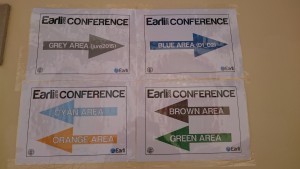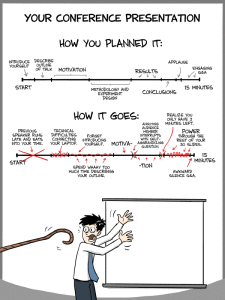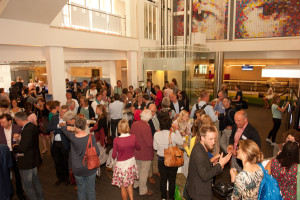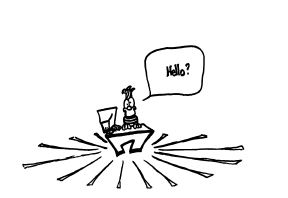There once was a PhD student – let’s call her Phyllis- working hard to land her research career. For that, she had to write a dissertation containing at least four studies. Her evil brain wanted her to not only conduct empirical studies, but also do a systematic literature review. At first, Phillis tried to find reasons for not doing it, because she dreaded that whole process. However, after a while she saw the greatness of the idea and took off to face the adventure. This adventure would not be a real adventure, had she not gotten into trouble several times. Read more
Posts by Author
So, what did I learn from my six-week stay abroad? 0
As you all might have noticed, we went offline for a little while. As much fun as we have when blogging about our PhD-lives, we need ideas for interesting blogposts. So, we took a little break, allowing ourselves to have experiences we could later write about. And look, here we are, back with new blogposts :-).
This week, I am taking you with me in a flashback to my stay in Berkeley. The previous time I wrote, it was mainly about my preparations for and my first experiences in Berkeley. Now, I have been back for a little over two months, and will write about what useful knowledge and experiences I gained. Because even though I was there for ‘just’ six weeks, what I brought back will last me months! In this blogpost I will focus on two of those insights I’ve gained. Read more
A PhD-student abroad: My first experiences from across the ocean 1
So, last Friday two weeks ago I left the gray-skied Netherlands for my big adventure to the United States. I was going to visit UC Berkeley for six whole weeks! I would be able to meet faculty from UC Berkeley and talk to them about my and their research. Before my departure I was, of course, nervous:
- I had a wish-list made for what to get for my research from this trip, would I be able to cross off everything on it?
- I would have to talk to many new people, every time explaining my research all over again and have it open for discussion
In this blogpost I want to share some of my experiences with you regarding these two points I just made.
My wish-list
It all started for real last Monday. I had my first meeting with my contact at UC Berkeley. In the 45 minutes I was in her office things went really fast; names of people I should really meet flew by, we discussed what I wanted to get from my stay at UC Berkeley, and I was suggested a book to read. After this meeting I soon realized that I probably won’t have to worry about checking off everything on my wish-list; it will probably get done. For, all the people whose names were mentioned during the meeting, would be told of my visit at UC Berkeley, which gave me an opening of contacting these people myself. Of course, this still gave me the, sometimes difficult, task of introducing myself a little over email, thinking of the reason why I would meet that specific person, and asking whether the person would have time to meet with me. Luckily, up until now everybody has responded positively. In addition, I have also visited some classes in the teacher education programs. And I am visiting some research group meetings. Thus, even after only two weeks, I can honestly say much on my wish-list has already been crossed off. I can start looking for some extra wishes :-).
I think what really helped in getting so far with my wish-list, is that I communicated it and I keep communicating (parts of) it to the people I meet with. For, they are the ones who can help me getting everything done. And although I now use this strategy on a visit abroad, I think this is very helpful in many different situations, also. I mean, if there is anything you want to do during your PhD, communicate it with the people around you. It is good if you want to find stuff out for yourself. I’m not saying you shouldn’t do that. But you will notice that with some help from others, you might get a little further, maybe the person you’ve just communicated your wishes to, knows just that specific person who can help you in achieving your goal.
Meeting new people everyday
The fact that I am crossing wishes off my wish-list, means that I have to meet new people everyday. That also means that over and over again, I have to explain my research. You would say that if I have to do that so often, it becomes easier and I can just hit the replay button that makes my brain tell my mouth to talk about my research. If only. It means that every time again, I look critically at what I am explaining and to whom. First of all, for almost everyone around here, I have to tell more about the context in which my research is taking place, than I would have to in the Netherlands; not everybody is familiar with the Dutch educational system. Second, you have to think about who you have in front of you and what his/her research interests are. I have experienced that the meeting will follow a much more natural course, if you find some common ground to talk about. For my meetings up to now, I didn’t have a whole set of questions prepared. I did some research about the person, came up with two, for me important, questions and went to see the person. Sometimes, I haven’t even used the question I had made up before, but it was good I had them. We would just find concepts to talk about that have kept both our interests and the meeting would just go. Still, I find it every time a challenge to think about how I am going to talk about my research with the next person, and what questions I want to ask him/her. So far, however, it has really paid off; at the moment I am really thinking over some concepts and my theoretical framework. But, the story behind that will follow in a later blogpost.
Well, this blogpost has been a lot about my experiences, but what message do I want to bring to you with this?
- Make a wish-list (about what you want to achieve: during your time as a Phd-student; at a conference; when visiting another university, etc.) and communicate it
- Look up people you are meeting and think about how you want to tell your story to them
- Think beforehand of some questions to ask the person you are meeting
- And, if you are going abroad, don’t forget to have fun too 😉
JURE2015 & EARLI 2015: looking back on my first international conferences 0

Just before our summerbreak, we uploaded the post ‘useful tips when attending a conference’. In this post several PhD-students from different universities in the Netherlands provided, as the title says, tips for when you are about to attend a conference. Just last week, I attended two European conferences together with some of my colleagues, the JURE (Junior Researchers conference) and the EARLI (European Association for Research on Learning and Instruction). In this blogpost I’ll reflect on how the tips from the post mentioned above helped me and expand on them further.
Keep yourself going – 7 tips to keep writing when finishing you dissertation from Jorine Vermeulen 0
About 5 months ago Anna van der Want wrote in a blogpost how she had planned NOT to finish her PhD, so she could continue doing the things she loved. If you decide in contradiction to finish your PhD, you might find some difficulties in pursuing that goal. Jorine Vermeulen (PhD student at Cito and University of Twente), you might remember her from the previous blogpost where she gave a conference-tip, is currently in that finishing-your-PhD-phase. She was kind enough, when I asked her how she kept on going in that phase, to provide some tips that I share, in her name, here:
in a blogpost how she had planned NOT to finish her PhD, so she could continue doing the things she loved. If you decide in contradiction to finish your PhD, you might find some difficulties in pursuing that goal. Jorine Vermeulen (PhD student at Cito and University of Twente), you might remember her from the previous blogpost where she gave a conference-tip, is currently in that finishing-your-PhD-phase. She was kind enough, when I asked her how she kept on going in that phase, to provide some tips that I share, in her name, here:
Useful tips when attending a conference 0
Last week Tessa and I gave you an overview of our experiences from a conference (the ORD2015) we recently attended. We really hope you had fun reading our experiences and maybe related to it from your own experiences. This time I would like to be more helpful with my blogpost by providing tips when attending conferences. Or, actually I should say that I am only helpful by showing these tips to you… Other people have provided them; I asked PhD students from ICLON and other institutes to provide tips for when you are attending a conference. The idea is that everyone (presenter, non-presenter, already having a large network, in a presentation not completely on your subject, etc.) attending a conference should find some useful tips in here.
Before the conference
Jorine Vermeulen (PhD student at CITO and University of Twente) told me to be sure to prepare before attending the conference: Take at least half a day in advance to check out the program and make a selection of must go to session as well as sessions you can possibly skip for an extra break, some working, or a meet up with some people you really want or need to talk to about your project.
Daniël van Amersfoort (PhD student at Welten Institute, Open University) gave a tip you should think about when signing up for the conference: Always visit pre- and post-conferences or, in case it is being organized, a doctoral consortium; most of the times these meetings are more profound than the conference itself. In addition, these are perfect places to meet people you will probably also see at the conference!
In addition he says you should not only try to schedule where you are to meet new people, but: If it is a bigger conference and there are specific people, or even ‘big names’ you want to meet, email them months before the conference. Using this approach, I have sat at a table with almost half my bookcase ;-)!

Preparing a presentation for the conference? Bas Agricola (part-time PhD student at Utrecht University) has some tips for you:
- Use the more standard building blocks for your presentation (theoretical framework and research question, method, results, and conclusion and discussion). This way it will be recognizable for you audience.
- Considering your PowerPoint, Prezi, or other way of presenting you use; do not use too many words on your slides. Try to prevent from writing full paragraphs, use key words.
During the conference
The time has finally come. It is time for the conference! Time to do something with your preparations. But also, to be spontaneous; you didn’t plan that extra break for meeting specific other people? No problem, according to Nienke Woldman (PhD Student at Wageningen University and president of VPO): Do n ot only attend presentation sessions. Make sure to have spare time to talk to other researchers. Making new contacts and maintaining ‘old’ ones is at least as important at a conference as exchanging information during sessions. Most of the times the scheduled breaks are too short for this. So, be spontaneous, decide suddenly to skip a session, grab a cup of coffee and see who you end up talking to. Sometimes at these, more quiet moments, you make really good contacts!
ot only attend presentation sessions. Make sure to have spare time to talk to other researchers. Making new contacts and maintaining ‘old’ ones is at least as important at a conference as exchanging information during sessions. Most of the times the scheduled breaks are too short for this. So, be spontaneous, decide suddenly to skip a session, grab a cup of coffee and see who you end up talking to. Sometimes at these, more quiet moments, you make really good contacts!
Daniël also made this point when I asked him for tips. Although he added: Do not stick with your colleagues the whole conference. You see these people often enough; go your own way. (also hearing Fleetwood Mac in you head right now?! I am….)
By the way, if you haven’t contacted those ‘big names’ do not think you’ve missed your chance. You have something to discuss with them? Do not hesitate to approach then and ask if you could discuss your research with them over breakfast or lunch.
Of course, during conferences the prepared presentations mentioned above are being presented. Are you presenting yourself? Bas has a tip for you: Share your doubts with the audience. Being transparent on the subjects you still have questions about will provide the best input for discussion and questions. And this in turn, will provide you with new information and thoughts to take home.
The idea during presentation sessions is that the audience is not a passive listener of what the presenter as to tell. Bas says: Actually, the same I just said about the presenter counts for the audience; share your thoughts. You do not have to be fully informed on the research subject of the presentation. You can always provide some new viewpoints on methodology and share your questions, criticism and feedback. Sometimes these new viewpoints are very refreshing for a researcher who is most of the time surrounded by his own research (subject).
How you can do this and what you can get from being an active listener, Tim (PhD student at ICLON, also blogger here on the research blog) shares with you.
Having attended several conferences as a non-presenter I would like to share some tips about ‘that what is not being said’. These can range from implicit assumptions, logical fallacies in reasoning, leaps of faith or simply not stating the obvious. To better understand the presenter and whatever it is (s)he is presenting about it can be very useful to make the implicit, explicit. For example:
- Make notes (mentally or physically) during a presentation on which implicit assumptions the speaker makes about any theoretical models being used. To what extent does the presented study rely on the mentioned model or theory? Is it being assumed that this is the only theory? A complete theory? Is it being contrasted with alternative theories?
- For studies which use a sample to generalize to a population: what exactly is the sample a sample of? What are the limits of generalizing the findings of the study? How representative (in size and characteristics) is the sample of the specific population?
- For studies which use inference statistics: to what extent are the analyses explorative (e.g. no a-priori established hypotheses were made and many analyses were performed) or confirmatory (e.g. a-priori established hypotheses were tested)? What does this tell you?
- For the ‘conclusions’ part of a presentation: are the conclusions sufficiently backed up by what was said before or are there hidden reasoning steps? If the given conclusions would not be true, would the presented study be able to found evidence for this? What are the alternative explanations or conclusions which may also have some – or maybe more – merit?
The goal is not to be overly skeptical, but to be sufficiently critical to look beyond what is being presented and (hopefully) learn more. This does not only help you to better understand presentations at a conference but might also prove helpful for your own studies, articles and presentations. But that’s just my assumption.
Now Jorine, Daniël, Bas, Nienke and Tim have flooded you with tips, I wish you a very fruitful conference the next time you attend one!

Oh, wait before I say goodbye here is a last tip from Nienke:
Never skip a ‘borrel’! Enjoying a drink together can be the beginning of the best collaborations!
Do you have tips that haven’t been shared? Let us know!
ORD2015: Experiences from the Dutch Educational Research Days 2015 0
 Usually we upload a new post every two weeks. However, last week the yearly ORD (Dutch Educational Research Days), a three-day conference, took place and we thought this conference deserved an extra post. Every PhD-student will go to at least one conference and you might therefore either recognize some situations depicted below, or use some of the experiences when preparing to go to a conference.
Usually we upload a new post every two weeks. However, last week the yearly ORD (Dutch Educational Research Days), a three-day conference, took place and we thought this conference deserved an extra post. Every PhD-student will go to at least one conference and you might therefore either recognize some situations depicted below, or use some of the experiences when preparing to go to a conference.
In this blogpost Tessa and I will give your our experiences from the ORD2015. Tessa, as a non-presenter who visited the ORD for the first time. Me, as a presenter of my first paper and who has visited the ORD now for the second time.
Me & My colleagues: a WAT-relationship 0
 Sometimes, when two people in a relationship each have their own house, their own businesses and value their independence, they could have a LAT-relationship: Living Apart Together. Sometimes, when a bunch of colleagues each have their own offices, their own projects and value their own intellectual paths, they could have a WAT-relationship: Working Apart Together. A PhD can be considered quite an individual job. Read more
Sometimes, when two people in a relationship each have their own house, their own businesses and value their independence, they could have a LAT-relationship: Living Apart Together. Sometimes, when a bunch of colleagues each have their own offices, their own projects and value their own intellectual paths, they could have a WAT-relationship: Working Apart Together. A PhD can be considered quite an individual job. Read more
How to start writing and keep it going 0
These past few weeks since my last blogpost I have been busy writing, as you probably might have guessed, considering this blogpost is ALSO about writing (is there anything else I can talk about at the moment?!). It wasn’t always as easy as I wanted to (I experienced enough terrifying moments), but last Friday I actually finished a new version of my paper 🙂 !!! Yay!
In order to get to that new version, I used a very productive approach and an useful app in addition to the three approaches I told you last time. Also I looked into another approach and some apps, in case the ones I chose weren’t sufficient. These approaches and apps are:
- Shut Up and Write (SUW)
- Focuswriter and FORCEdraft
Guest post by Francesc Esteve – 5 Interesting Things about my Research Stay at ICLON-Leiden 2
My name is Francesc Esteve, I am from Spain (SP), and I have just presented my doctoral dissertation at the Rovira i Virgili University. During the last semester I did a research stay at the ICLON Graduate School of Leiden, and I like to explain my international experience in this post.
I started my PhD four years ago. After finishing the theoretical framework and data collection, I thought it might be a good idea to stay a while at another European university, to share and compare my results, draw future lines of work and finish writing my work.
I’ve tried to summarize this experience in 5 points detailed below, five things to highlight, that I’ve learned or that’ve surprised me.



Recent Comments